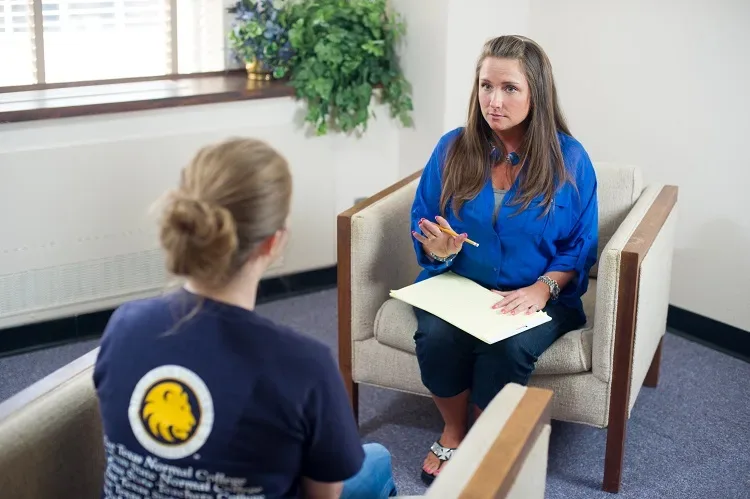
According to the National Institute of Mental Health (NIMH), approximately 19.1 million adults have experienced an anxiety disorder in the past year in the United States alone. The NIMH estimates that roughly a third of all people will experience some type of anxiety disorder in their lifetimes.
With anxiety disorders being so prevalent, many people may wonder what anxiety looks and feels like. Whether you think you may be facing anxiety yourself, or have noticed anxiety-like behaviors in someone you love, here are answers to your questions, like “how does anxiety affect your daily life?” and “how do I overcome anxiety?”
What is anxiety?
Anxiety is a term that designates tension, nervousness or worry that is connected to some potential event or unfavorable outcome. Everyone will experience anxiety at some point or another, but when anxiety becomes overwhelming, it may qualify as a clinical condition.
Anxiety disorders include generalized anxiety disorder (this is what most people call simply “anxiety”), agoraphobia, panic disorder, separation anxiety, social phobias and others. While each anxiety disorder has specific characteristics and symptoms, they all share one thing in common: intense and persistent fear or worry that feels uncontrollable and interferes with daily living.
How does anxiety affect your daily life?
Sometimes it’s hard to identify a mental health condition by reading a definition. Here are real-life examples of life with anxiety that can help clue you into whether an anxiety disorder is at play.
- Fear that others will judge you for your appearance, so you find excuses to avoid school, like saying that you feel sick or skipping class
- Having an intense fear of dogs so you change your route to work to avoid walking by any houses where there are dogs, even if the route takes double the time
- Being extremely nervous about a work presentation, so you say your car wouldn’t start on the way in and you consider making a career change
- Struggling to feel like you belong in a social situation and missing social events, even ones that you committed to
- Slowly isolating yourself because you feel that your friends don’t actually like you and it’s a burden to hang out with you
- Struggling to speak in public, like ordering food or asking for an excuse for yourself when you need to get through a crowd of people
- Having racing thoughts before going to work and fearing that you’re not qualified for your job and that people will find out
If these examples of how anxiety can affect your daily life have resonated with you, it may be time to get in touch with professional treatment. If anxiety is preventing you from normal activities, like going to work or school, making and keeping friends or doing daily tasks, it’s possible to find healing and lead a normal life with minimal worry.
How do you know if you have clinical anxiety?
If you’ve wrestled with feeling anxious, but are unsure whether your experiences warrant intervention, therapy or medication, there’s good news for you: you don’t have to make the call on your own. If you think your anxiety may be severe, or if it’s worsened over time, getting in touch with professional care means you’ll receive a personalized assessment.
An intake assessment, or level of care assessment, can help you determine whether clinical anxiety is present. A medical doctor or mental health professional will ask about your health history, your presenting symptoms, and whether additional medical or mental health concerns are present and ask questions regarding the diagnostic criteria for anxiety.
Life with anxiety is a personal experience, so an assessment can’t be easily assessed online by a one-size-fits-all type of quiz. That’s why it’s important to get a professional opinion. You’ll know you’re getting the best care when you reach out for help.
How do you overcome anxiety?
Mental health treatment is your best bet for overcoming anxiety in the long term. However, there are some tips you can implement starting today that can make a real difference in how you manage your symptoms and live your life.
Take a timeout
When you start to feel anxious and the feeling builds, it can feel like you’re no longer in control. One of the best ways to immediately remedy anxiety is to take a step back from the situation and find a calming spot to let yourself ride out the waves. Eventually, you’ll learn to build coping skills into this pause.
Take care of your body
There are many physiological factors that can contribute to anxiety. In order to prevent anxiety or reduce the intensity of the sensation of nervousness, make sure you’re getting enough sleep, eating balanced meals, avoiding excess caffeine and alcohol, getting regular exercise and spending time away from screens.
Build useful coping skills
Coping skills are habits that you develop to minimize distress the moment you are feeling anxiety. These skills can include deep breathing, stretching, listening to a meditation, praying, calling a friend, cuddling with a pet, listening to an affirming song or using a sensory fidget. Each person will benefit from unique coping skills.
Get the Right Treatment
You don’t have to deal with an anxiety disorder on your own. Life with anxiety isn’t easy, but you can manage symptoms and find interior healing that can make your daily life feel manageable and enjoyable. You deserve to feel fully alive again and the Light Program can help. Call the Light Program now to get started.






